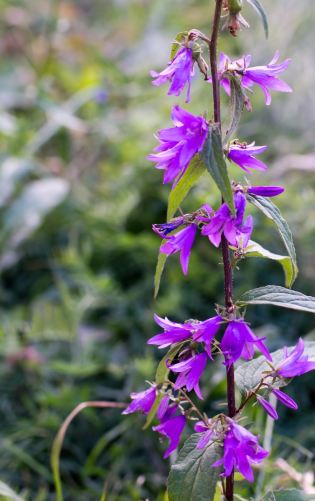
Yes, campanula plant is a perennial plant that comes back every year. Campanula, commonly known as bellflowers, is a diverse genus of flowering plants with approximately 300 different species that belong to the family campanulaceae.
Their colors range from blue, purple, pink, and white, and they produce delicate bell-shaped flowers that can be single or clustered. These plants are popular among gardeners because of their hardiness and their ability to adapt to different growing environments.
Campanulas prefer well-draining soil and plenty of sunlight but are also tolerant of shade. They can be used in a variety of settings, from rock gardens and borders to hanging baskets and containers. Maintaining these plants is easy, as they require only moderate watering and occasional deadheading to encourage more flowering.

Credit: www.whiteflowerfarm.com
The Beauty Of Campanula
Campanula is a popular choice among gardeners because of its aesthetic features. The perennial plant boasts a range of different species, each with unique characteristics that set them apart. With its delicate bell-shaped flowers and striking hues of blue, purple and white, its beauty is truly unrivaled.
Gardeners are drawn to the easy-to-care-for plant because of its low maintenance and ability to return year after year. Campanula’s popularity is owed to the fact that it is not only visually appealing, but also symbolizes gratitude and everlasting love.
Its charm has stood the test of time, making it a timeless addition to any garden.
The Secret Of Campanula’S Perennial Charm
Campanula, also known as bellflower, is a beloved and charming perennial that brings beauty to gardens year after year. Understanding its life cycle is what makes it perennial. Campanula grows from seeds, and after blooming, it produces seed pods that can be harvested.
Germination usually occurs in spring, and the plant grows rapidly, leading to a beautiful bell-shaped flower display throughout the summer months. The reasons why campanula is a great value flower is that they are incredibly easy to grow, come in various shapes, sizes and colors, and offer a long season of blooms.
So add some charm to your garden and get campanula today!

How To Grow Campanula
Campanula, commonly known as bellflowers, are perennial plants that come in a wide variety of sizes and colors. To grow campanulas, select a well-drained soil with good moisture retention and full sun to partial shade. The soil should be slightly acidic with a ph level between 5.
5 to 7. 0. Campanulas thrive in soil that is rich in organic material, so be sure to amend the soil with compost or well-rotted manure. Water regularly to maintain moisture levels in the soil. Campanulas can be grown in many settings, such as rock gardens, borders, and containers.
With their charming bell-shaped flowers and low-maintenance nature, these perennials are sure to enhance any garden.
Common Problems And Solutions When Cultivating Campanula
Campanula plants are known for their perennial charm, and they can return year after year if properly cared for. However, there are possible issues that may arise when cultivating these plants. One common problem is overwatering, which can lead to root rot.
To solve this issue, make sure the soil is well-drained and only water when the top inch of soil is dry. Another issue is inadequate sunlight, which can cause stunted growth or wilting. In this case, move the plant to a sunnier spot.
Additionally, pests such as spider mites and slugs may attack campanula. Use organic pesticides or slug baits to control their population. Remember, with proper care and maintenance, campanula can be a beautiful addition to any garden.
Different Varieties Of Campanula
Campanula, commonly known as bellflower, is a resilient, flowering plant that usually blooms during the summer season. There are over 300 species of campanula, including the dainty harebell, the towering canterbury bells and the ground-hugging creeping bellflower. Each species has its unique features, with different sizes, shapes, and colors of blooms.
Some varieties are perfect for ground covers, while others are suitable for borders, rock gardens and as cut flowers. The biennial and perennial species of campanula are incredibly popular with gardeners, thanks to their ability to self-seed and reliably return year after year.
If you’re looking to add color and charm to your garden, consider planting a campanula. It’s a favorite among seasoned gardeners for a good reason!
When To Plant Campanula
Campanula is a hardy perennial that blooms throughout the summer months. The ideal time to plant campanula depends on the climate and temperature. In general, campanula prefers cool temperatures and a moist soil environment. Spring is typically the best time to plant campanula, as it allows the plant to establish its roots before the summer heat sets in.
However, it can also be planted in the fall. Planting in the fall allows the plant to establish its roots before winter sets in, leading to an earlier bloom the following season. Ensure that you choose a location that receives full or partial sunlight for best results.
Planting campanula is not difficult, and with careful consideration of the seasonal preferences, it can thrive in your garden for years to come.

Conclusion
Based on the information we have gathered, it is evident that campanula is a hardy and reliable perennial plant that will come back year after year. There are many different varieties, each with their own unique characteristics and growing requirements.
Some varieties, like the campanula glomerata, are known for their impressive bloom displays, while others, like the campanula carpatica, are better suited to rock gardens. That being said, regardless of the variety, campanula is an excellent choice for any gardener looking to add a splash of color and interest to their garden.
As with any plant, it is important to do your research and ensure that you are providing the proper care for your campanula to ensure its continued success. With a little knowledge and effort, you can enjoy the beauty of this lovely flower for many years to come.




